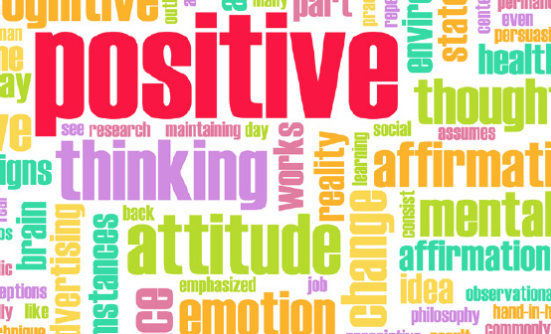My oldest child, Andrew, has a clear talent for finding the silver lining, no matter what. In ninth grade, he was performing poorly in Spanish class; at the midway point of the fall semester, his grade was a 50. I was pretty anxious about this until Andrew called to tell me he had good news about Spanish. But when Andrew proudly announced his 58 grade, it was not by any stretch of the imagination the good news I had expected to hear.
Nevertheless, Andrew was undaunted and pointed out that this grade was 8 points higher than his midterm average. When I noted that a 58 was still an F, Andrew in his optimism responded that it was really an F+. I then reminded him, perhaps less calmly by this point, that I was a professor, and there was no such thing as an F+ grade. But again, he pointed out that his trajectory—meaning the 8-point improvement—suggested he would have a 66 at the end of the second trimester.
Obviously, Andrew is a master at seeing all things in an optimistic light, and while his Spanish grade is clearly disappointing, his interpretation of his grade (F+) is actually quite encouraging. After all, anyone who can call home with the good news about a 58 clearly has a remarkable ability to find the good in any situation.
I’m starting this piece with Andrew’s story to illustrate the tremendous role our thoughts play in how we interpret and react to virtually all life experiences. Bad things happen to us all—a failed romantic relationship, a disappointing work outcome, scary medical news. But we respond to difficult events in really different ways.
Some people, like my son, seem magically able to find the silver lining in any situation. Perhaps you’ve heard the joke about the very optimistic boy who, upon receiving a room full of horse poop for Christmas, exclaims, “There must be a horse in here somewhere!”
And other people, and I include myself in this group, don’t naturally find the silver lining. Instead, we obsess about and ruminate over bad events in our past, replay them over and over in our minds, and imagine the worst possible outcomes for events in our future. This approach is certainly not the recipe for feeling better.
In this piece, I’ll first describe why those who approach life with a more positive mindset are happier and healthier, regardless of their life circumstances. I’ll then describe scientifically based strategies we can all use to adopt a rosier outlook and find greater happiness, no matter our natural inclination.
Mindset Matters
Think about the last time you felt stressed—heart racing, stomach queasy, tension in your muscles. This type of natural physiological reaction to stress is designed to help us respond to extreme, life-threatening situations—say when you are chased by a large barking dog or when you are in combat during war. These physiological reactions may also be adaptive during other seemingly “high-pressure” situations, such as during a job interview or on a first date.
Unfortunately, this tendency to show a stress response even in these non–life-threatening situations can have a negative impact on our physical health. This ongoing activation of the stress response in our daily lives may help explain the high rate of stress-related illnesses, including headaches, ulcers, and coronary heart disease. As Stanford neuroscientist Robert Sapolsky writes, “Stress-related disease emerges, predominantly, out of the fact that we so often activate a physiological system that has evolved for responding to acute physical emergencies, but we turn it on for months on end, worrying about mortgages, relationships, and promotions.”1 This may be why, as Sapolsky cleverly notes, “zebras don’t get ulcers,”1 but humans often do.
But it isn’t just the experience of stress that impacts health—the perception that stress impacts health also plays a major role. In one study, researchers asked nearly 29,000 people to rate their overall level of stress over the last year and how much they believed that stress impacted their health—a little, a moderate amount, or a lot. People who reported having experienced a lot of stress and who also believed that stress had a large impact on their health were 43% more likely to die over the next 8 years. In contrast, people who experienced a lot of stress but did not feel that stress had a major impact on health were no more likely to die than those who had experienced little or moderate levels of stress.
This finding indicates that it isn’t necessarily the experience of high levels of stress that increases the risk of mortality but rather a high level of stress coupled with the belief that stress leads to negative health outcomes. In fact, people who believe that stress affects health “a lot or extremely” are more than twice as likely to die of a heart attack compared with those without such beliefs.
On the other hand, people who go through life with a positive outlook not only feel happier, they also experience better physical well-being across virtually all dimensions. They have fewer physical symptoms, such as coughing, fatigue, and sore throats, and recovery from surgery faster and with less pain. They have lower rates of both major and minor illnesses, including asthma, flu, ulcers, hypertension, diabetes, and even strokes and coronary heart disease. Perhaps most remarkably, among people receiving chemotherapy, those who are high in optimism show a greater decline in cancer markers.
People who go through life with a positive outlook have better health in part because they experience less stress. When they face difficult life circumstances, they use adaptive coping mechanisms—tackling problems head on, seeking out social support, finding the silver lining, and so on. This proactive approach to stress minimizes its effects and its wear and tear on the body. In turn, people who see the glass as half full have stronger immune systems and are thus better able to fight off minor infections.
In one study, researchers measured happiness in 193 healthy adults, and then—with the participants’ permission—inserted a cold virus up their nostril. (These people were paid a fair amount of money, and remember, colds aren’t life-threatening in healthy people.) Then, for the next 4 weeks, the participants reported on their cold-related symptoms, such as coughing, sneezing, runny nose, and so on. Although all participants had had a cold virus directly inserted into their bodies, not all of them ever developed a cold. In fact, people with an overall more positive outlook reported fewer cold symptoms and were less likely to develop a cold at all. These findings held true even when researchers took into account other variables that could impact susceptibility to illness, such as age, sex, body mass, and overall health.
These studies all point to the power of positive thinking. People who adopt a positive outlook see stress as less damaging and cope with stressful events more effectively when they do occur. In turn, they are not only happier but also healthier. This is all the more reason for every single one of us to make the effort to adopt a positive mindset.
Strategies to Shift Your Mindset
Although all of us feel happy at times, some people, like my son, go through life naturally feeling pretty good. These people go through life expecting things will work out well for them and find it relatively easy to look on the bright side. (This ability to foresee only positive outcomes is vividly illustrated by Sigmund Freud’s story about the man who said to his wife, “If one of us should die, I shall move to Paris.”2) They are also resilient, meaning they bounce back from negative experiences with relative ease.
But the good news is that no matter what our natural tendency, with practice we can all get better at responding to life’s challenges in more positive ways. In fact, learning and practicing strategies for adopting a more positive mindset changes neural pathways in the brain so that this sort of adaptive response becomes more natural. As Barbara Fredrickson, a psychologist at the University of North Carolina, notes, “Taking the time to learn the skills to self-generate positive emotions can help us become healthier, more social, more resilient versions of ourselves.”3
If adopting a positive mindset doesn’t come naturally to you, here are some strategies that scientific research shows will help you feel better.
Express Gratitude
It is perhaps human nature—at least for many of us—to focus on what’s bad in our lives, instead of what’s good. But as the philosopher Epictetus says, “He is a man of sense who does not grieve for what he has not, but rejoices in what he has.”4
Research points to a very simple strategy for increasing our happiness by simply focusing on what we are grateful for. In one study, researchers assigned people to 1 of 3 groups:
- Those in the first group were asked to write down 5 things they were grateful for in their lives over the past week (the “gratitude condition”); their lists included such things as God, kindness from friends, and the Rolling Stones
- Those in the second group were asked to write down 5 daily hassles from the past week (the “hassles condition”); their lists included such things as too many bills to pay, trouble finding parking, and a messy kitchen
- Those in the third group simply listed 5 events that had occurred in the past week (the “control condition”); their lists included attending a music festival, learning CPR, and cleaning out a closet.
Before the experiment started, all participants had kept daily journals recording their moods, physical health, and general attitudes; the researchers could then compare how people in these different conditions changed over time.
What do you think they found? People who were in the gratitude condition felt fully 25% happier—they were more optimistic about the future, and they felt better about their lives. What was particularly remarkable was that people in this group also did almost 1.5 hours more exercise a week than those in the hassles or events condition, and had fewer symptoms of illness.
Does this type of simplistic approach work only on relatively young, healthy people—who, after all, have many things in their lives to feel grateful about and relatively few major stressors? No. Other research reveals the benefits of focusing on gratitude, even for people who are managing serious illnesses. For example, women with breast cancer who complete a 6-week online gratitude intervention, in which they spend 10 minutes writing a letter expressing gratitude to someone in their life each week, show better psychological well-being and adaptation to cancer. These findings suggest that simply writing about things you are grateful for has physical benefits, not just psychological ones, even among people who are dealing with major health conditions.
So, take a few minutes every day—maybe right before you go to sleep at night or when you first wake up in the morning—and think about things you are grateful for right now in your own life. Next, make a plan for regularly finding ways to focus on gratitude. Write in a gratitude journal before you go to sleep each night or when you first wake up, start a family tradition of going around the dinner table each night and saying one thing you are grateful for that day, or make a point of sending a thank you e-mail or letter once a month to someone in your life.
Practice Self-Compassion
One of the easiest ways we can help manage stress, while minimizing the negative effects of stress on health, is to simply give ourselves a break. People who have high levels of self-compassion, meaning a tendency to treat oneself with kindness and compassion, think about negative events in less dire terms. They also are less likely to blame themselves when bad things happen, which in turn reduces the experience of stress.
People who cut themselves some slack when bad things happen are also better able to fight off minor and major illnesses. To test the benefits of practicing self-compassion on health outcomes in one study, researchers asked people to assess their own acceptance of aspects of their flaws and inadequacies and then take a stress test. They then measured participants’ levels of inflammation, a physiological marker of stress linked with cardiovascular disease, cancer, and Alzheimer’s disease.
Their findings revealed that people who were lower in self-compassion had higher levels of inflammation even before taking the stress test, indicating that these people basically go through life experiencing more stress. People who were low in self-compassion also showed even higher inflammation after the stress test, indicating that they react in adverse ways to normal daily life stressors. Over time, their lack of self-compassion could impact their health and even their longevity.
So, here’s an easy way to feel happier and be healthier: cut yourself some slack. Forgive yourself, be kind to yourself, and treat yourself with care and compassion.
Smile
There’s an old Chinese proverb that says, “A smile will gain you ten more years of life.”5 And empirical research now demonstrates there is some truth in that saying.
If you are wondering how holding a big smile could actually improve your health, here’s what the researchers found. The mere act of smiling may actually lead directly to physiological changes in the body that improve health. For example, one clever study asked people to keep chopsticks in their mouths while holding 1 of 3 distinct types of facial expressions: a genuine smile, the type that you automatically make when you find something funny; a standard smile, the type that you make when posing for a photo, and a neutral expression. Then, while holding their assigned facial expression, participants were asked to undergo a pretty painful task: to hold 1 hand in a bucket of freezing cold ice water.
Their findings revealed the substantial impact of smiling on the ability to tolerate pain. Those who were holding either type of smile had lower heart rates, showing that their bodies were feeling less stress. What is particularly important about this research finding is that smiling led to benefits even among people who weren’t happy. In other words, this study examined only the effects of smiling—meaning the facial expression people held. They weren’t examining genuine happiness. And yet they still found that people who held their faces in a genuine smile experienced lower levels of pain.
If adopting a positive mindset doesn’t come naturally to you, start smiling more, even when you don’t feel like it. Smiling changes how people react to you (always for the better), which will make you feel good. And this good feeling will lead to less stress, lower heart rate, and better health. As Vietnamese Buddhist monk and author Thich Nhat Hanh writes, “Sometimes your joy is the source of your smile, but sometimes your smile can be the source of your joy.”6 So even pretending you feel happy can, over time, lead to happiness—and may also improve your health.
Let It Go
Randy Pausch, a professor of computer science at Carnegie Mellon University, was 45 years old when he was diagnosed with pancreatic cancer. After undergoing a year of unsuccessful treatments, doctors told him the disease was terminal and that he should expect only 3 to 6 months of “good health.”
Less than a month after receiving this prognosis, Pausch delivered an upbeat and inspirational speech, his “last lecture,” in which he shared his considerable wisdom about how to live life to its fullest. One of his main points was to recognize the value of simply having fun. As he noted, “Never underestimate the importance of having fun. I’m dying, and I’m having fun. And I’m going to keep having fun every day because there’s no other way to play it.”7
Pausch’s message illustrates precisely how optimists cope, even when facing truly dire circumstances. They focus on what they can control—having fun, in his case—and they don’t ruminate or wallow in sadness and regret.
This ability to let things go helps people maintain a positive outlook, especially when they have absolutely no control over the situation and thus can’t simply take action to fix or solve it. Those without this natural inclination to look on the bright side, in contrast, often become mired in negative thoughts in the face of serious, yet uncontrollable, events.
Researchers in one study examined people’s reactions to a local major natural disaster—the 1989 Loma Prieta earthquake near San Francisco, which killed 57 people and caused tremendous property damage. Some people reported they tended to distract themselves from negative feelings about this disaster, such as by doing something fun with friends or going to a favorite place to take their mind off the event. Other people reported they tended to ruminate about the disaster, such as by repeatedly thinking about the moment the earthquake hit, the people who died, and what might happen in the next earthquake.
Two months later, researchers surveyed both groups to examine how they were faring. As you can probably predict, ruminating about this disaster led people to feel worse. Those who dwelled on negative aspects about the earthquake had more symptoms of depression and posttraumatic stress disorder than people who didn’t have such thoughts.
Repeatedly focusing on negative thoughts can, over time, even lead to clinical depression. For example, people who ruminated following the death of a partner due to a terminal illness were more likely to be depressed 6 months later, even when taking into account the level of social support, pessimism, gender, and other life stressors. In fact, people who ruminate over traumatic events are 4 times more likely to develop clinical depression than those who do not (20% vs 5%).
This type of cycling in negative thoughts can also lead to physical symptoms. Women with breast cancer who report persistent negative thoughts show not only higher levels of depression but also more pain, more severe physical symptoms, and lower quality of life.
These findings illustrate that one of the key predictors of depression is simply a failure to let the bad things go. In other words, people who are depressed get fixated on bad thoughts and just can’t seem to pull themselves out of this negative cycle. As psychologist Jutta Joormann notes, “They basically get stuck in a mindset where they relive what happened to them over and over again.”8 And, not surprisingly, going over and over the negative in life brings us down.
What’s the Take-Home Point?
We often assume that experiencing negative events leads us to feel bad. And although it is true that disappointing and upsetting life experiences can have short- and long-term consequences on our happiness, it is not the mere experience of such events but rather how we react to, or think about, them that really matters. In sum, even when people experience the exact same event, how they respond to and think about it has a major impact on how they feel.
I started this piece by describing my son’s disappointing (at least to me) performance in his freshman Spanish class, and I want to end it by returning to that story. After his 58 grade, the teacher insisted he get a tutor and come to see her every week, and these steps actually led to significant improvement. By the end of his first year, Andrew had pulled his grade up to an A–, which his teacher told me was the single best improvement she’d ever seen. He continued taking Spanish throughout high school, and then—much to our surprise—decided he wanted to take a gap year living in Peru before starting college. Why? To accomplish his goal of arriving at college fluent in Spanish. Today, Andrew is a junior in college, and you can probably guess his major: Spanish.
This story illustrates why finding that silver lining is so beneficial. People who approach life with a positive outlook have a remarkable ability to find some good no matter the situation and to take negative events in stride. And, most importantly, scientific research now shows that adopting a positive mindset leads to better psychological well-being, including fewer symptoms of anxiety and depression, and better physical health, even for those coping with really difficult circumstances.
But here’s the good news for those who struggle to feel happy: no matter our natural tendency, we can all achieve greater happiness and better health by making relatively small changes in how we think about ourselves and the world. My natural inclination is not to find the silver lining, but with time and energy and effort, I find it easier all the time to shift my thinking in ways that do make me happier. And my goal in writing this piece is to give others who also struggle to feel happy specific, scientifically based strategies they can use to improve the quality—and perhaps even longevity—of their life.
As author Elizabeth Gilbert writes in her 2006 memoir Eat, Pray, Love, “Happiness is the consequence of personal effort. You fight for it, strive for it, insist upon it, and sometimes even travel around the world looking for it. You have to participate relentlessly in the manifestations of your own blessings. And once you have achieved a state of happiness, you must never become lax about maintaining it. You must make a mighty effort to keep swimming upward into that happiness forever, to stay afloat on top of it.”9
I hope this piece has inspired you to start making that effort right now.
References
- Sapolsky RM. Why Zebras Don’t Get Ulcers: An Updated Guide to Stress, Stress-Related Diseases, and Coping. New York, NY: W. H. Freeman and Co; 1998.
- Freud S. The Interpretation of Dreams. Brill AA, trans. New York, NY: Macmillan; 2013.
- Mountain Express Magazine. Your Health and Emotions. http://mountainexpressmagazine.com/your-health-and-emotions. Accessed August 20, 2019.
- Epictetus. The Works of Epictetus. Consisting of His Discourses, in Four Books, The Enchiridion, and Fragments. A Translation from the Greek based on that of Elizabeth Carter, by Thomas Wentworth Higginson. Boston, MA: Little, Brown, and Co; 1865.
- Proverbicals.com. https://proverbicals.com/smile. Accessed August 20, 2019.
- Goodreads, Inc. www.goodreads.com/quotes/7704-sometimes-your-joy-is-the-source-of-your-smile-but. Accessed August 20, 2019.
- Pausch R, Zaslow J. The Last Lecture. New York, NY: Hyperion; 2008.
- Association for Psychological Science. Depression and Negative Thoughts. www.psychologicalscience.org/news/releases/depression-and-negative-thoughts.html. Accessed August 20, 2019.
- Gilbert E. Eat, Pray, Love: One Woman’s Search for Everything Across Italy, India and Indonesia. New York, NY: Riverhead Books; 2005.















